Planet Earth 2007: Top 10 Science Revelations

Get the world’s most fascinating discoveries delivered straight to your inbox.
You are now subscribed
Your newsletter sign-up was successful
Want to add more newsletters?

Delivered Daily
Daily Newsletter
Sign up for the latest discoveries, groundbreaking research and fascinating breakthroughs that impact you and the wider world direct to your inbox.

Once a week
Life's Little Mysteries
Feed your curiosity with an exclusive mystery every week, solved with science and delivered direct to your inbox before it's seen anywhere else.

Once a week
How It Works
Sign up to our free science & technology newsletter for your weekly fix of fascinating articles, quick quizzes, amazing images, and more

Delivered daily
Space.com Newsletter
Breaking space news, the latest updates on rocket launches, skywatching events and more!

Once a month
Watch This Space
Sign up to our monthly entertainment newsletter to keep up with all our coverage of the latest sci-fi and space movies, tv shows, games and books.

Once a week
Night Sky This Week
Discover this week's must-see night sky events, moon phases, and stunning astrophotos. Sign up for our skywatching newsletter and explore the universe with us!
Join the club
Get full access to premium articles, exclusive features and a growing list of member rewards.
Climate Change
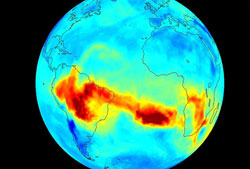
The Intergovernmental Panel on Climate Change issued its fourth report this year and its strongest statement yet that human activities are a prime cause of global warming. The scientists who wrote the report warned of the potentially catastrophic and unstoppable changes that could occur if emissions of greenhouse gases such as carbon dioxide are not curbed, including droughts, sea level rise, more severe weather, melting of glaciers and polar ice and floods. Even if man-made emissions are curtailed, the global warming's effects will likely continue for centuries, the report stated.
Arctic Meltdown
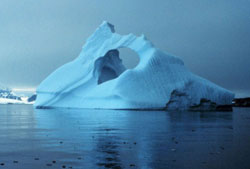
This was a bad year for polar bears too, as summer ice melt reached a record extent in the Arctic. (Greenland too saw a record level of melt, enough to cover twice the area of the United States.) While the melt was a boon to marine vessels, opening up the fabled Northwest Passage, it could spell trouble for the polar environment, and the globe, if it keeps up each year. Two studies found that winter sea ice has been retreating and growing thinner in recent years, and massive summer melts could start a downward spiral decreasing permanent ice at the North Pole in the coming decades.
Extreme Weather
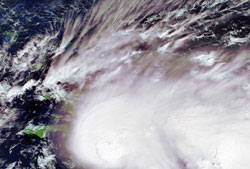
Several studies this year pointed out that our addition of increasing amounts of carbon dioxide into the atmosphere are prodding Earth's climates to varying extremes. One study found that more hurricanes are forming now than a century ago, threatening the millions of people that live along the world's coastlines, though some argue that this may not be the case because old storm records could be incomplete—Victorians didn't have satellites after all. Other studies find that European heat waves are longer than they used to be and predict long scorching summers in story for parts of Europe, particularly the Mediterranean, in the future.
Good and Bad News on Alternative Energy

Natural gas came a step closer to being used in everyday cars with the development of a new storage tank that makes the fuel source a better option for more compact vehicles. Ethanol had a roller coaster year with some research improving its possible use—one team developed earless corn that could be a better source of the biofuel and other researchers used cow stomach fluid to better break down the raw material for use in a fuel cell. But other scientists called into question the advisability of using ethanol as a fuel source because it may take more energy to produce than it provides and may be more harmful than gasoline. Further research in the coming years may determine whether ethanol becomes the new gasoline or whether biofuels go bust.
Carbon Dioxide
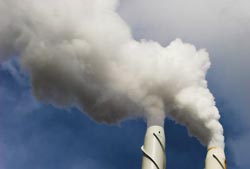
Despite the dire predictions of scientists of the effects of continuing to emit carbon dioxide and other greenhouse gases, one study this year found that emission rates are actually accelerating because of the rising amount of the gas needed to produce one unit of wealth and the declining efficient of Earth's natural carbon sinks. Other studies showed how much carbon dioxide these sinks were taking up, with drought reducing the amount of carbon dioxide that plants take up, but forest growth increasing the amount that trees siphon out of the atmosphere. Just what effect will win out will be seen in the coming years and will present challenges to governments making plans to curb emissions.
Coral Cold Sores
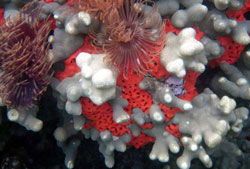
Between warming seas, pollution and overfishing, coral reefs have had it rough in recent years, and this year was no exception. Scientists at San Diego State University found that when humans and reefs are neighbors, reefs just can't compete and become susceptible to diseases, particularly herpes viruses. Corals don't just get cold sores, however. They die. Another study found that all these stresses are killing coral reefs off faster than previously thought, causing them to disappear twice as fast as rainforests on land.
Endangered Animals

Despite some good news for endangered animals, such as the discovery of a massive wildlife migration across previously war-torn southern Sudan, animals are becoming increasingly under threat by deforestation and other forms of habitat destruction, pollution and poaching. In its annual Red List of Threatened Species, the World Conservation Union announced that 200 species moved closer to extinction in 2007, with more than 40,000 species, including gorillas, dolphins, corals and many species of birds and fish, total on the list.
Get the world’s most fascinating discoveries delivered straight to your inbox.
Drought
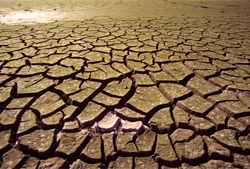
While a severe drought brought parts of the Southeast to its knees for several months this fall, those living in the Southwest (which has been in drought for years, if you buy the new definition of drought) may have a more extended drought to contend with... for the next 90 years. A study in the journal Science found that Earth's warming temperature could shift wind and rain patterns so that dry areas become drier and wet areas become wetter, leaving places like the American Southwest permanently parched.
Antarctic Surprises
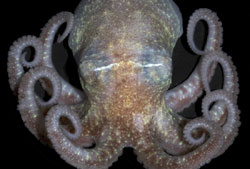
Earth's southernmost continent yielded a host of surprises this year. Satellite lasers detected a series of previously unknown subglacial lakes under the Antarctic ice, which drain and fill very rapidly and could shed light on how water below the surface moves ice streams above. An undersea expedition found several strange creatures, including sea lilies, sea cucumbers and a psychedelic octopus, thriving on the sea floor beneath a collapsed ice sheet, adding to the unexpected biodiversity found in one of the world's most pristine marine environments.
Impending Oil Peak

With the price of oil climbing and the world's heavy dependency on this fossil fuel, estimates of just how much oil we have left are critical knowledge for governments and policy makers. A new study this year predicted that global oil production could peak as soon as 2008, and would likely do so before 2018. After this peak, production would decline, causing potential supply problems, though experts disagree on just how much oil might be left in the Earth.
 Live Science Plus
Live Science Plus





